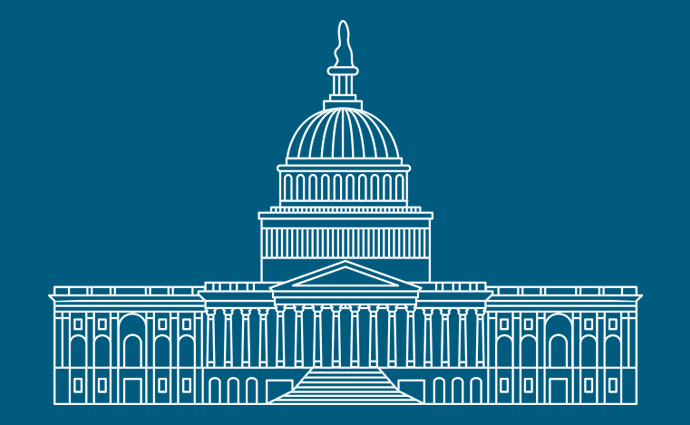Congress Passes CARES Act Giving $100B in Hospital Funds for COVID-19
The $2T coronavirus stimulus package will provide hospital funding through increased Medicare payments and other grants.

Source: Getty Images
- Updated 03/27/2020: The House of Representatives has passed the Coronavirus Aid, Relief and Economic Security (CARES) Act, sending the bill to President Trump's desk awaiting signature. The bill will give $100 billion to hospitals and community health centers to promote economic stability as they ramp up efforts to address the COVID-29 outbreak.
Hospitals and community health centers are among those slated to receive billions of dollars in funding from the historic $2 trillion coronavirus stimulus package approved by the Senate on Wednesday.
For more coronavirus updates, visit our resource page, updated twice daily by Xtelligent Healthcare Media.
The stimulus package will provide more than $100 billion in hospital funding to provide emergency relief to hospitals struggling to stay afloat financially as the novel coronavirus rapidly spreads throughout the US.
“There is much more money for our hospitals, for our nurses and physicians, for our nursing homes, for our community health centers to do the job they need to do,” Senate Minority Leader Chuck Schumer (D-NY) said after reaching a bipartisan agreement earlier Wednesday morning.
The stimulus package passed unanimously in a 96-0 vote yesterday will give hospitals what they asked for – $100 billion in funding.
In a letter to Congressional leaders on March 19, the American Hospital Association (AHA), the American Medical Association (AMA), and the American Nurses Association (ANA) asked Congress for $100 billion to help frontline providers overcome operational issues, such as the cancelation of elective procedures, a surge in capacity for COVID-19 patients, and shortages in key supplies such as protective personal equipment (PPE).
According to the stimulus package, Congress is willing to meet that figure and more. The package will also include other key provisions to help hospitals respond to the novel coronavirus outbreak, including:
- Increasing Medicare reimbursement rates for COVID-19 hospitalizations by 20 percent during the emergency period
- Suspending the 2 percent Medicare sequestration through Dec. 31, 2020
- Waiving face-to-face requirements for telehealth services during the emergency period
- Expanding the Medicare Hospital Accelerated Payment Program
- Requiring payers to cover COVID-19 tests performed by hospitals and laboratories
- Delaying Medicaid Disproportionate Share Hospital (DSH) payment reductions
The stimulus package would also delay and reduce payroll tax payments by 50 percent for employers, including hospitals and health systems. The AHA and other provider groups advocated for a payroll tax reduction in order to sustain operations during the outbreak.
Other healthcare provisions included in the stimulus package would enable physician assistants and nurse practitioners to furnish home health services and federally qualified health centers and rural hospitals to serve as a distant site for telehealth – and get paid for the services.
The package would also funnel $16 billion for the purchase of medical supplies for the Strategic National Stockpile, which includes PPE, and $1 billion for purchases under the Defense Production Act. Community health centers would also receive $1.3 billion to bolster their efforts to combat COVID-19.
On Wednesday, the AHA supported the stimulus package even though the association noted that Congress will need to take additional action to ensure hospitals and other providers can make it through the difficult time.
“This bill includes important provisions that will help us respond, including the creation of an emergency fund grant program, additional support for taking care of COVID-19 patients and relief from spending cuts, among other provisions,” stated Rick Pollack, AHA president and CEO.
“This support will help those hospitals from rural and urban communities that are in dire financial need due to this devastating pandemic. The AHA supports this legislation and urges the Senate and House to act quickly to pass it.”
The stimulus package also received an initial thumbs up from the American Medical Association (AMA), which said the bill “provides needed financial relief to hard-hit workers, health systems, and physician practices.”
“At this critical moment, physician practices need significant financial support to sustain themselves and continue to meet the health care needs of all Americans during this time,” added Patrice A. Harris, MD, MA, president of the AMA.
The AMA and other provider groups also applauded provisions to increase much-needed PPE supplies.
“The first priority is patient care and safety, and that’s why this funding for PPE is so important,” stated Jerry Penso, M., MBA, president and CEO of AMGA (American Medical Group Association). “But the Senate also is acknowledging the incredible financial strain COVID-19 is creating for providers, who quickly recognized the need to change their practice patterns so they can fight the virus.”
Congress expects the stimulus package to pass on Friday when the House plans to vote on the bill. President Trump has also signaled that he will sign the approved package immediately.
